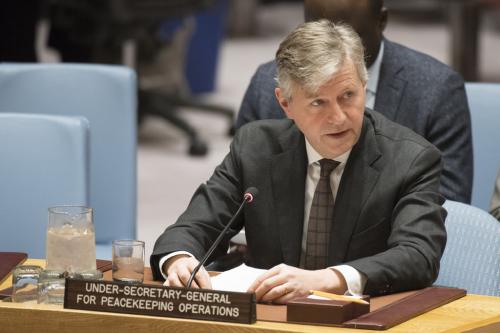Amid growing insecurity, time to reassess UN peacekeeping presence in Mali, Security Council told
Against the backdrop of worsening security in Mali’s central regions and with presidential elections just six months away, a senior United Nations official on Tuesday said it is time to reexamine the configuration of the UN peacekeeping presence in the West African country to reflect the changing circumstances on the ground.

Jean-Pierre Lacroix, Under-Secretary-General for Peacekeeping Operations, addresses the Security Council on the situation in Mali.
“Looking forward, central Mali is likely to command sustained attention and to become an increasingly prominent feature in peace and reconciliation efforts,” said Jean-Pierre Lacroix, the Under-Secretary-General for Peacekeeping Operations, briefing the Security Council, and noting that Mopti region has the highest number of terrorist attacks documented.
Describing the situation as “a race against time,” with growing insecurity claiming hundreds of civilian lives in the north and centre of Mali, Mr. Lacroix said the human rights and humanitarian situation is worsening as well, with aid workers estimating that 4.1 million Malians, or 22 per cent of the population, possibly facing food insecurity in 2018 – a proportion that could reach 30 to 40 per cent of inhabitants in the north and centre.
The goal now must be to create conditions conducive for elections and, going forward, the peace process, he said.
The UN Multidimensional Integrated Stabilization Mission in Mali (MINUSMA) was established by Security Council resolution 2100 of 25 April 2013, following an uprising by armed groups earlier that year. The Mission supports the transitional authorities of Mali in the stabilization of the country and implementation of the transitional roadmap.
“Five years after the Mission’s establishment and two years and a half after the signature of the peace agreement, we believe the time has come to reassess the assumptions that underpin MINUSMA’s presence, review its key mandated tasks against achievements on the ground and reexamine the Mission’s layout through a comprehensive strategic review,” he said.
Recalling the Council’s request to develop a mission-wide strategic plan for a phased implementation of mission mandate and a transition plan that would hand over relevant tasks to the UN Country Team, Mr. Lacroix said that “it would be important that these two plans be informed by the findings of the strategic review to be conducted in the next weeks.”
In the meantime, MINUSMA continues to focus on core mandated tasks with notable achievements in its good offices and ‘protection of civilians’ efforts, he added.
He said that despite persisting capability gaps, including for crucial assets such as helicopters, MINUSMA has pursued its efforts to project the robust posture mandated by the Council, noting that since the beginning of the year, peacekeepers repelled three attacks against advance positions in Kidal region and one ambush in Mopti region, while three improvised devices exploded against Mission vehicles.
While these attacks resulted in only minor injuries to two peacekeepers, the review on peacekeepers fatalities recently conducted by General Santos Cruz highlighted the need to further enhance efforts, such as ensuring that all peacekeepers receive the training and equipment necessary to operate in such hostile conditions.
“We are currently working with MINUSMA to take all necessary measures to implement the recommendations of the report,” Mr. Lacroix said.
The peacekeeping chief noted that Prime Minister Maiga convened a Cabinet meeting dedicated to addressing insecurity in the central region while the national coordination body of the integrated plan for security for the region is now operational.
Turning to the operationalisation of the G5 Sahel joint force, comprising Burkina Faso, Chad, Mali, Mauritania and Niger, to combat terrorism and transnational organized crime in the restive region, he welcomed the launch of its second operation, as well as the establishment by the G5 Sahel Secretariat of a coordination cell to provide political oversight to the operations of the joint force.
Meanwhile, consultations for the conclusion of the technical agreement between the G5 Sahel, the UN and the European Union (EU) are progressing, Mr. Lacroix said, noting that the UN is working closely with the EU and the African Union on a joint resource mobilization strategy, ahead of the donors conference of 23 February in Brussels.
Development partners are also stepping up their efforts. Since October 2017, the Peace Building Fund launched four projects focused on Mopti and Sÿgou regions for a total of $8 million. These projects aim at enhancing the participation of women and youth in reconciliation efforts and prevent inter-community conflicts, including by restoring traditional conflict mediation mechanisms.
However, most of these initiatives remain in the inception phase and are yet to produce significant changes on the ground, he said, stressing that the upcoming presidential elections will mark the beginning of a new chapter in the stabilization of Mali.
Source:United Nations
- 230 reads
Human Rights
Ringing FOWPAL’s Peace Bell for the World:Nobel Peace Prize Laureates’ Visions and Actions

Protecting the World’s Cultural Diversity for a Sustainable Future

The Peace Bell Resonates at the 27th Eurasian Economic Summit

Declaration of World Day of the Power of Hope Endorsed by People in 158 Nations

Puppet Show I International Friendship Day 2020

